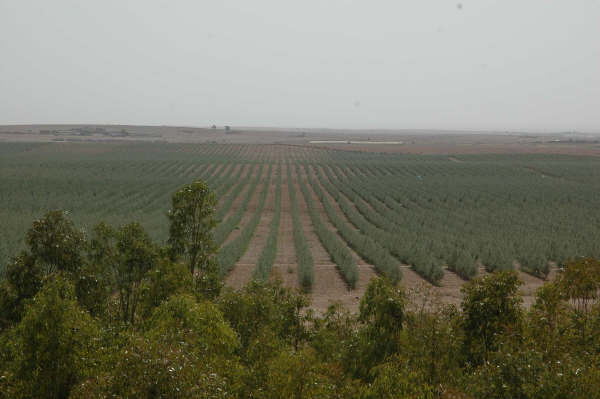EU expands Tunisia olive oil import quota ahead of free trade talks

Borderlex | 17 September 2015
EU expands Tunisia olive oil import quota ahead of free trade talks
Iana Dreyer
The EU and Tunisia will launch negotiations towards a ‘deep and comprehensive free trade agreement’ (DCFTA) in October 2015. A Commission decision on 17 September 2015 to expand an import quota on olive oil originating from the North African country shows the bloc is already preparing to open up to Tunisian agricultural products. But it is not clear how far it will be able to go down that path.
In 2011, the EU’s response to Tunisia’s democratisation process included an offer to launch negotiations towards a DCFTA. Four years later, both parties are finally getting started. Brussels and Tunis seek to update a 1998 free trade pact included their current Association Agreement. The latter is part of a series of ”Euromed” agreements the EU signed with North African and Middle Eastern countries in the mid 1990s. Economists have criticised these agreements for not opening up European markets sufficiently to meet North African export needs and for not reducing key trade and investment barriers in these countries, notably in the services sector.
An EU-Tunisian DCFTA would address many of these shortcomings. DCFTAs are agreements initially offered to Europe’s eastern partners Ukraine, Georgia, Moldova and Armenia. In contrast to standard European free trade agreements, DCFTAs require partners to align part of their legislation and technical and sanitary standards with the EU’s. Though DCFTAs go very far in liberalising trade they do not throw open markets immediately, let alone fully. Existing DCFTAs so far provide for transition periods and maintain import barriers in very sensitive products.
A key political challenge in the EU is to satisfy the demands of its North African partners while managing resistance to import competition by Southern European farmers. So far, these have fought hard to maintain high barriers to imports of Mediterranean produce. The 1998 Association Agreement with Tunisia maintains import quotas on products like tomatoes, cucumbers, aubergines, peas, oranges, mandarines - not forgetting olive oil. The EU’s high barriers to agricultural trade have however complicated the EU’s political relationships with North African partners.
EU strategists believe the EU must make an effort and open its agricultural markets quickly in a period of high political turbulence in the region. “What [North African countries] need - if we really want to help them – are immediate market openings in relatively few products where they have a competitive advantage. And these are mostly agricultural products where there is strong vested interests on the EU side”, Michael Leigh, Senior Advisor to the German Marshall Fund told Borderlex in an exclusive interview in April 2015.
DCFTAs involve a cumbersome negotiation process that can take years. DCFTA negotiations launched with Morocco in 2013 are curently on halt.
The EU is ostensibly trying to send a signal of commitment to Tunisia, the only country that has successfully managed its democratic transition after the 2011 ‘Arab Spring’, but which has recently been rattled by terrorist attacks. Today the Commission announced ”a unilateral annual duty free tariff rate quota of 35 000 tonnes for Tunisia’s exports of olive oil to the EU, in addition to the existing 56 700 tonnes under the [1998] EU-Tunisia Association Agreement”. The measure will be in place until 2017.
The EU’s foreign policy chief Federica Mogherini said: “Exceptional times call for exceptional measures. Today’s proposal is a strong signal of EU solidarity with Tunisia. Tunisia can count on the EU ‘s support in such a difficult time.”
Arnaud Petit, director for bilateral free trade agreements at the agricultural producer association Copa Cogeca in Brussels told Borderlex that increasing imports from Tunisia could put further downward pressure on olive oil prices in Europe. This would add to the current problems of producers in Spain and Italy, who are already facing challenges to their business because of the olive tree desease caused by the bacterium Xylella fastidiosa. With the Commission’s announcement today ”there is likely to be major worries in Italy and Spain”, Petit said. He also added that increasing imports from Tunisia could lead to further risks of illegal olive oil mixtures leading to lower quality standards, which is already a wide-spread problem in Europe. Petit questions whether Tunisia’s administration can undertake adequate controls.
Olive oil is Tunisia’s eighth most important export product after wires & cables, electrical equipment, textiles, garments, and petroleum. In 2013 it exported US$ 504 (€ 570) million worth of olive oil. The EU mostly imported machinery products (€ 3.5 billion in 2014) and textiles and clothing (€ 2.4 billion) from Tunisia.
Tunisia is a small market for European exporters. Yet it offers opportunities for European agricultural exporters and investors. “Tunisia has an excellent climate for certain seeds and for reproduction of seeds such as rapeseed”, Petit explained. Tunisia is also an interesting market for European white meat and wheat, which currently face trade barriers there.
Tunisia is one of the most open economies in North Africa. It unilaterally eliminated most import tariffs on EU industrial imports in 2008. However it has hardly committed to liberalising its services sector in any international trade agreements, be it in the World Trade Organization or in its Association Agreement with the EU.





